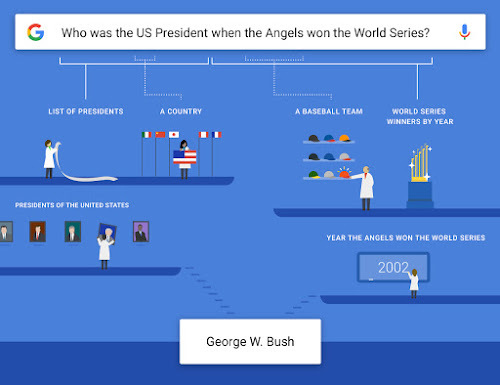Now we’re “growing up” just a little more. The Google app is starting to truly understand the meaning of what you’re asking. We can now break down a query to understand the semantics of each piece...
...so we can get at the intent behind the entire question. That lets us traverse the Knowledge Graph much more reliably to find the right facts and compose a useful answer. And we can build on this base to answer harder questions.
Here are a few new types of complex questions Google can now handle. First, we understand superlatives—”tallest,” “largest,” etc.—and ordered items. So you can ask the Google app:
“Who are the tallest Mavericks players?”
“What are the largest cities in Texas?”
“What are the largest cities in Iowa by area?”Second, have you ever wondered about a particular point in time? We now do a much better job of understanding questions with dates in them. So you can ask:
“What was the population of Singapore in 1965?”
“What songs did Taylor Swift record in 2014?”
“What was the Royals roster in 2013?”And finally, we’re starting to understand some complex combinations. So Google can now respond to questions like:
“What are some of Seth Gabel's father-in-law's movies?”
“What was the U.S. population when Bernie Sanders was born?”
“Who was the U.S. President when the Angels won the World Series?”We’re still growing and learning, which means we make mistakes. Ask Google “Who was Dakota Johnson's mom in the movie?”, and we’ll respond with the movies of Dakota Johnson’s real-life mother Melanie Griffith, not the actor Jennifer Ehle who played Anastasia’s mother Carla in the 50 Shades of Grey movie. (Hey, that one’s tricky even for people!)
But the next time you’re curious about something, ask the Google app, and know that we’re working hard on understanding your questions better so that we can find the answer to whatever you’re looking for.
